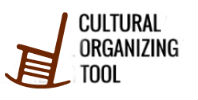 |
Watch the VideosWhat is the Zilphia Horton Cultural Residency Project?
|
Key Stages of the Cultural Organizing ResidencyThis segment of the learning tool elevates the four main phases of the Cultural Organizing Residency and highlights the difference between a traditional artist residency and cultural organizing residency. Examples of the four main stages will be take from the residencies in Dothan, AL, New Orleans, LA, and Great Cacapon, WV to highlight how different each of these stages can look depending on the community you are working with. This clip will also provide our cultural organizers with an opportunity to reflect on what their experiences during the residency. Entering Community/ Exiting Community A proficient Cultural Organizer knows how to enter community. They understand how and what to listen for that tells the most about a community. The Cultural Organizer knows how to help identify the Authentic Leadership. Once a Cultural Organizer enters community they need to begin thinking about how to gracefully exit that community making sure to leave new knowledge and skills with the community and let folks know that “they have everything they need in their bones to continue to do the work, and do it better.” Deep Listening A Cultural Organizer must spend a majority of their time deeply listening to communities in which they are working. They must understand the history and culture of the communities in which they are working. You start with people’s experiences, begin to look for patterns, and also listen to what people are not saying so that you are able to effectively navigate the terrain of your residency. Sweat/Equity All Cultural Organizers must get down and dirty with the communities in which they are working. This could mean helping to wash cars if the organization they are partnering with is having a car wash to raise money for an event or getting on the phone lines if people are phone banking to help turn out folks to an event. Skills Transfer A proficient Cultural Organizer understands that the engagement with a community may be limited. The Cultural Organizer is not the engine that runs a community and yet all humans have a certain level of need for closure. Cultural Organizers must understand how to give of themselves to a community, transfer knowledge and skills, and close the engagement in such a way that the community clearly understands they are to take the learning to the next engagement with or without the Cultural Organizer. |
|
Photo Gallery |